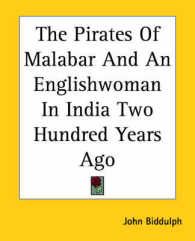Full Description
Tommy Ferrarini uses a macro-comparative, longitudinal and institutional approach to study the origins and the consequences of those institutions affecting family policy in eighteen post-world war welfare democracies.This book argues that the wide variety of cross-national differences in family policy legislation that existed in these societies by the end of the 20th century - and continue to exist today - are structured by different underlying political power constellations based on social class as well as gender. The author goes on to highlight how the extent to which family policy is designed to support highly gendered divisions of labour within families or dual earner families is also associated with different cross-national patterns of female labour force participation, childbearing, child poverty and gender role attitudes. The institutions of family policy may therefore be viewed as incentive structures as well as normative orders; reflecting the motives underlying such legislation and affecting behaviour and the world orientation of individuals.
Families, States and Labour Markets will appeal strongly to policymakers and country experts within the field of social and family policy. Academic researchers at many levels of academe in social policy and political economy will also find much to engage them within this book.
Contents
Contents: 1. Introduction: Family Policy in Comparative Perspective 2. Maternal, Parental, Paternal: Development of Family Policy Transfers in Post-war Welfare Democracies 3. Politics of Family Support: Determinants of Different Types of Family Policy Transfers in 18 Countries 1970-2000 4. Family Policy, Fertility and Women's Work: Consequences of Family Support on Childbearing and Female Labour Force Participation in 18 Welfare States 1970-2000 5. Family Support and Child Poverty: Generosity of Family Policy Transfers and Poverty Among Families with Young Children in 16 Countries 1980-2000 6. Family Policy Models, Gender Role Attitudes and Family-work Reconciliation in 15 Welfare States 7. Conclusion Bibliography Index







